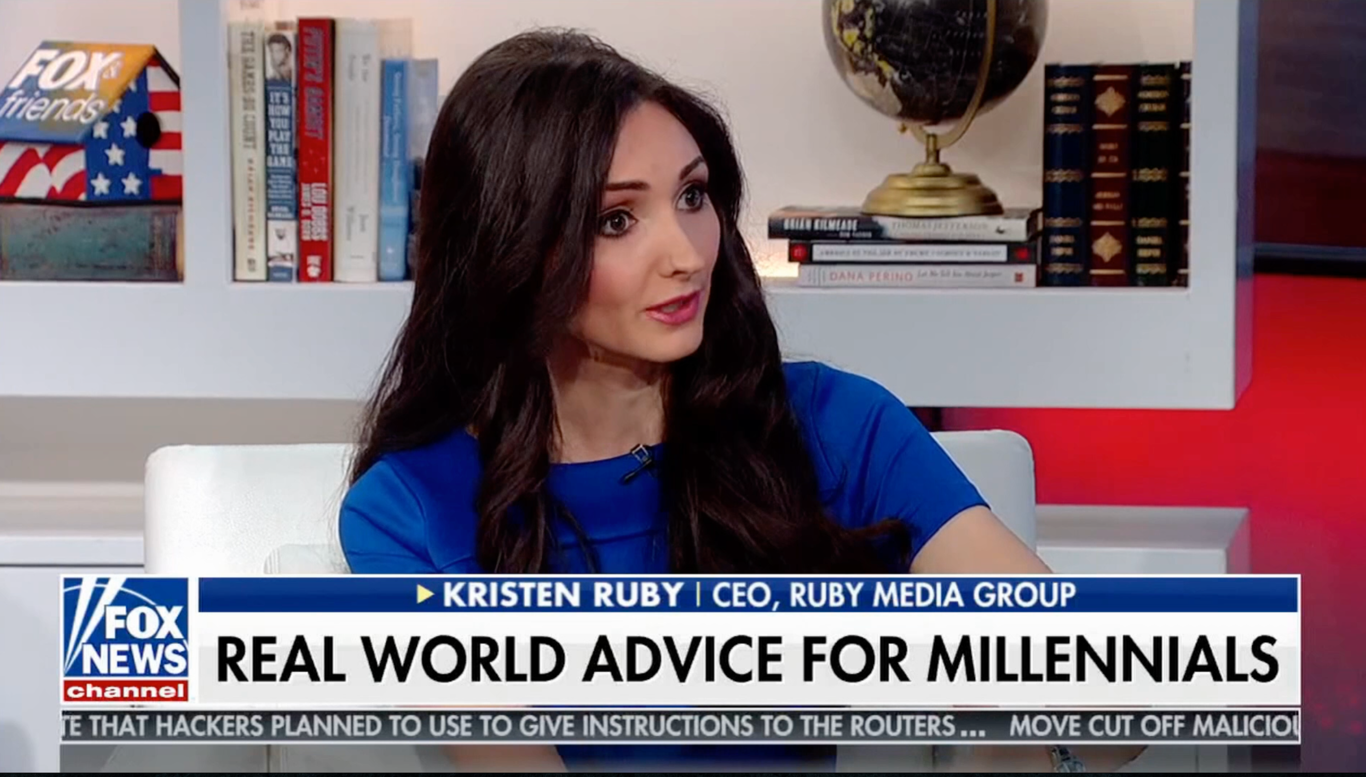|
Getting your Trinity Audio player ready...
|
NY Social Media Strategist Kris Ruby of Ruby Media Group recently shared Business Advice for Millennials on Fox News “Fox & Friends.” Click here to watch the full segment.

Social Media Trends | Hot Takes & Internet Culture
Social Media Algorithms reward hot takes. One social media expert warns why this is a dangerous mistake that can lead to an increase in disinformation.
What is a hot take on social media?
A hot take is an uninformed opinion that lacks depth and nuance and intentionally aims to provoke. It is a form of provocative digital commentary with the goal of gaining followers and likes, rather than providing substantive commentary based on factual reporting.
Breaking News: You Don’t Always Have to Have A ‘Hot Take’ To Share On Social Media.
Is it time to end the social media hot-take journalism epidemic?
Social media algorithms reward sharing a hot take on every story as it happens live in real-time. This is problematic because the content has not even been fact-checked before someone shares an opinion on it.
On-air commentators are expected to have a polarizing opinion on every issue. Social media has created an environment where every individual on social media now thinks that they are a pundit, too.
There is no delineation between the craft of on-air commentary and armchair commentators on Twitter.
As a pundit for the past fifteen years on cable news, I am well versed in the art of commentary. But part of that art is understanding the responsibility that comes along with what you say and what you don’t say. The art of silence is just as critical as the art of commentary. No comment is equally as important as what your comment is.
Understanding the fine line between the two is what defines longevity in the industry.
Knowing when not to speak is just as critical as what you say when you do speak.
A true subject matter expert knows what is in their scope of practice and what is outside of it.
They do not speak on anything and everything because of the publicity or media opportunity around it. Doing this actually devalues subject matter expertise over time.
I come from a traditional cable news background where I approach every breaking story with the mindset of: who is the best guest to speak on this?
The responsibility is on you to make that determination; a producer won’t always know what is in your scope and what is outside of it.
Being on air is not the end goal; providing a well-informed opinion on something you have deep vertical industry expertise in is.
Unfortunately, the goal post continues to shift.
Content has consequences; whether intentional or unintentional.
It is wise to remember this before tweeting out an opinion on social media.
When you spout off an opinion that is not true expert knowledge, someone could act on the advice and make a mistake that could cause emotional, financial, or psychological suffering as a result of the advice.
Social media companies are less strict about this, but Google certainly isn’t, which is why there is an entire section in The Google Quality Rater Guidelines called: Your Money, Your Life (YMYL).
Your audience follows you because they trust you. Don’t abuse that trust. When you are more careful about what you say, you protect others from following misinformed advice and opinions.
You know when you have shared something that truly adds value to the conversation when you do not immediately think about deleting it right afterward. It is not only about protecting yourself- yes, you should think about that with the heightened concerns around cancel culture– but more importantly, you should think about the people who trust you that are consuming your content and information.
Reminder; you do not need to have a hot take on Twitter in response to every breaking news item.
Tweeting about a topic you vaguely understand can cause long-term reputational harm and can also result in you being canceled.
Be careful with your words and exercise more caution when you post polarizing opinions on heated topics.
If you feel a strong urge to tweet a hot take on a trending topic, ask yourself:
- What are you looking to gain from it?
- What is the anticipated outcome you are hoping for?
- Am I looking for an emotional reaction?
- Am I looking for a social media dopamine rush?
- Am I looking to gain followers?
If you are posting to feel something- it is most likely more about you than it is about your audience. And if you don’t have an answer, consider skipping the post altogether.
If you ask a Doctor a question they can’t answer- they will say- see a specialist to answer that- I wouldn’t want to give you the wrong advice. They know what is in their scope and what is outside of it.
Ask yourself: Why does my opinion matter on this topic? Not all opinions are equal. If I never owned a cat, and legislation was just passed around cats- a cat owner or vet would be better to speak on the topic.
As a society, we have completely lost the art of nuanced conversation.
Social media has created a flattened hierarchy where everyone’s opinion is treated the same. This is problematic because there is no structure to what opinions we should listen to and what opinions we need to filter out during a crisis.
For example, if we are heading into a world war, hearing from military experts, foreign affairs officials, government officials, and former White House administration officials would be helpful to inform your personal opinion on a topic.
But the problem is that everyone on social media believes their opinion is equivalent to a military expert, even if they have never served a day in the military.
This further perpetuates the problem leading to non-experts doling out expert-level advice.
The way to fix this broken mechanism is to ask yourself if you are contributing to the problem or solving the problem.
Wait for your turn and be patient. Your time to step into the spotlight will come.
There is a time and place and room for every subject matter expert. A subject matter expert is not an expert on every topic. I could spend twelve months studying a topic before sharing an opinion on it. By the time I do provide an opinion, it is informed after months of doing deep level investigative journalism research that shapes my opinion.
The media should ideally be a channel to disseminate and condense information with expert analysis from vetted sources.
Opinions should be rooted in deep expertise and analysis. The same holds true for social media channels, too.
An opinion without research behind it is not the same as an opinion with no research or field experience to support an opinion.
Be confident in the topic you are speaking on.
Throughout my national television career as an on-air social media commentator, I have been asked to speak on various topics on a wide range of sociopolitical issues.
My Dad always said- only speak about what you know. This advice has served me well, and it serves the viewers well too.
When you speak from a place of confidence, you speak from a place of service.
When your knowledge can genuinely lead to helping someone make their own informed opinion vs. forming an opinion for them, the audience will feel it- and you will feel it too.
Someone who speaks on every topic and has an opinion on everything is not an expert; they are overly opinionated. Do not mistake the false sense of confidence for true expertise. If someone claims to be an expert on every topic and has an opinion on everything, they are most likely an expert on nothing.
Unfortunately, social media sites reward the exact opposite. The algorithms reward uninformed hot takes that lead to polarizing and extreme views.
Arrogance is not expertise.
A great way to tell the difference is to observe a user’s behavior in social audio discussions. Look at the people who insist on speaking and who never sit silently in the audience to listen to others.
Look at the people who rarely listen to what others say and instead only want others to listen to what they have to say. A sense of publicly displayed superiority is rarely a hallmark trait of a true subject matter expert.
An expert is careful with their words and takes great pride in not speaking about topics they know nothing about.
A true subject matter expert is happy to stay silent for long stretches of time.
If someone doesn’t take pride in their words, they most likely don’t take pride in their work.
Examine how loose someone is with their words. Do they use their words to uplift others or do they trash others? Do they appear overly jealous of industry competitors?
Are they focused on contributing to their industry or do they focus on bashing perceived rivals? Do they frequently contribute to their industry with conferences, presentations, thought leadership research, and podcast appearances?
Or do they spout out strong opinions with little to nothing to back it up? It is easy to say why everyone else is wrong or a fraud. It is easy to put everyone else down around you. It is harder to consistently contribute to your industry.
The people who engage in this type of behavior are often not well revered why anyone in any industry, which is why they callously make grandiose and bold statements like this for clickbait. Attention-seeking social media tactics do little to attract anything valuable and lead to constant negative attention. If someone spends all day trash talking other industry rivals on social media, they most likely are unemployed and have nothing else to do.
These are not the type of people you want to surround yourself with.
Surround yourself with people who have something to lose.
Someone who has nothing to lose will cut corners, play dirty, and try to derail your success.
MEDIA:
Huffington Post: No, You Don’t Always Have to Post a Hot Take on Social Media
KRIS RUBY is the CEO of Ruby Media Group, an award-winning public relations and media relations agency in Westchester County, New York. Kris Ruby has more than 15 years of experience in the Media industry. She is a sought-after media relations strategist, content creator and public relations consultant. Kris Ruby is also a national television commentator and political pundit and she has appeared on national TV programs over 200 times covering big tech bias, politics and social media. She is a trusted media source and frequent on-air commentator on social media, tech trends and crisis communications and frequently speaks on FOX News and other TV networks. She has been featured as a published author in OBSERVER, ADWEEK, and countless other industry publications. Her research on brand activism and cancel culture is widely distributed and referenced. She graduated from Boston University’s College of Communication with a major in public relations and is a founding member of The Young Entrepreneurs Council. She is also the host of The Kris Ruby Podcast Show, a show focusing on the politics of big tech and the social media industry. Kris is focused on PR for SEO and leveraging content marketing strategies to help clients get the most out of their media coverage.

